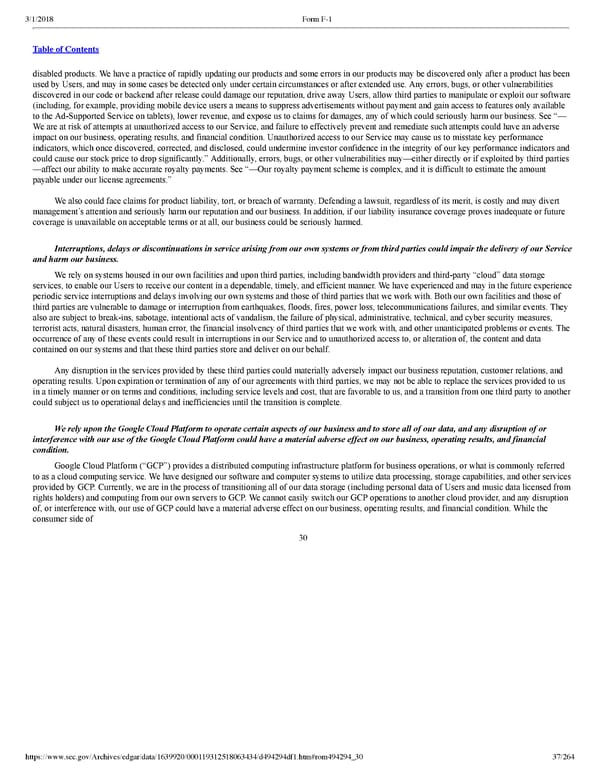37/264 disabled products. We have a practice of rapidly updating our products and some errors in our products may be discovered only after a product has been used by Users, and may in some cases be detected only under certain circumstances or after extended use. Any errors, bugs, or other vulnerabilities discovered in our code or backend after release could damage our reputation, drive away Users, allow third parties to manipulate or exploit our software (including, for example, providing mobile device users a means to suppress advertisements without payment and gain access to features only available to the AdSupported Service on tablets), lower revenue, and expose us to claims for damages, any of which could seriously harm our business. See “— We are at risk of attempts at unauthorized access to our Service, and failure to effectively prevent and remediate such attempts could have an adverse impact on our business, operating results, and financial condition. Unauthorized access to our Service may cause us to misstate key performance indicators, which once discovered, corrected, and disclosed, could undermine investor confidence in the integrity of our key performance indicators and could cause our stock price to drop significantly.” Additionally, errors, bugs, or other vulnerabilities may—either directly or if exploited by third parties —affect our ability to make accurate royalty payments. See “—Our royalty payment scheme is complex, and it is difficult to estimate the amount payable under our license agreements.” We also could face claims for product liability, tort, or breach of warranty. Defending a lawsuit, regardless of its merit, is costly and may divert management’s attention and seriously harm our reputation and our business. In addition, if our liability insurance coverage proves inadequate or future coverage is unavailable on acceptable terms or at all, our business could be seriously harmed. Interruptions, delays or discontinuations in service arising from our own systems or from third parties could impair the delivery of our Service and harm our business. We rely on systems housed in our own facilities and upon third parties, including bandwidth providers and thirdparty “cloud” data storage services, to enable our Users to receive our content in a dependable, timely, and efficient manner. We have experienced and may in the future experience periodic service interruptions and delays involving our own systems and those of third parties that we work with. Both our own facilities and those of third parties are vulnerable to damage or interruption from earthquakes, floods, fires, power loss, telecommunications failures, and similar events. They also are subject to breakins, sabotage, intentional acts of vandalism, the failure of physical, administrative, technical, and cyber security measures, terrorist acts, natural disasters, human error, the financial insolvency of third parties that we work with, and other unanticipated problems or events. The occurrence of any of these events could result in interruptions in our Service and to unauthorized access to, or alteration of, the content and data contained on our systems and that these third parties store and deliver on our behalf. Any disruption in the services provided by these third parties could materially adversely impact our business reputation, customer relations, and operating results. Upon expiration or termination of any of our agreements with third parties, we may not be able to replace the services provided to us in a timely manner or on terms and conditions, including service levels and cost, that are favorable to us, and a transition from one third party to another could subject us to operational delays and inefficiencies until the transition is complete. We rely upon the Google Cloud Platform to operate certain aspects of our business and to store all of our data, and any disruption of or interference with our use of the Google Cloud Platform could have a material adverse effect on our business, operating results, and financial condition. Google Cloud Platform (“GCP”) provides a distributed computing infrastructure platform for business operations, or what is commonly referred to as a cloud computing service. We have designed our software and computer systems to utilize data processing, storage capabilities, and other services provided by GCP. Currently, we are in the process of transitioning all of our data storage (including personal data of Users and music data licensed from rights holders) and computing from our own servers to GCP. We cannot easily switch our GCP operations to another cloud provider, and any disruption of, or interference with, our use of GCP could have a material adverse effect on our business, operating results, and financial condition. While the consumer side of 30
 Spotify F1 | Interactive Prospectus Page 36 Page 38
Spotify F1 | Interactive Prospectus Page 36 Page 38